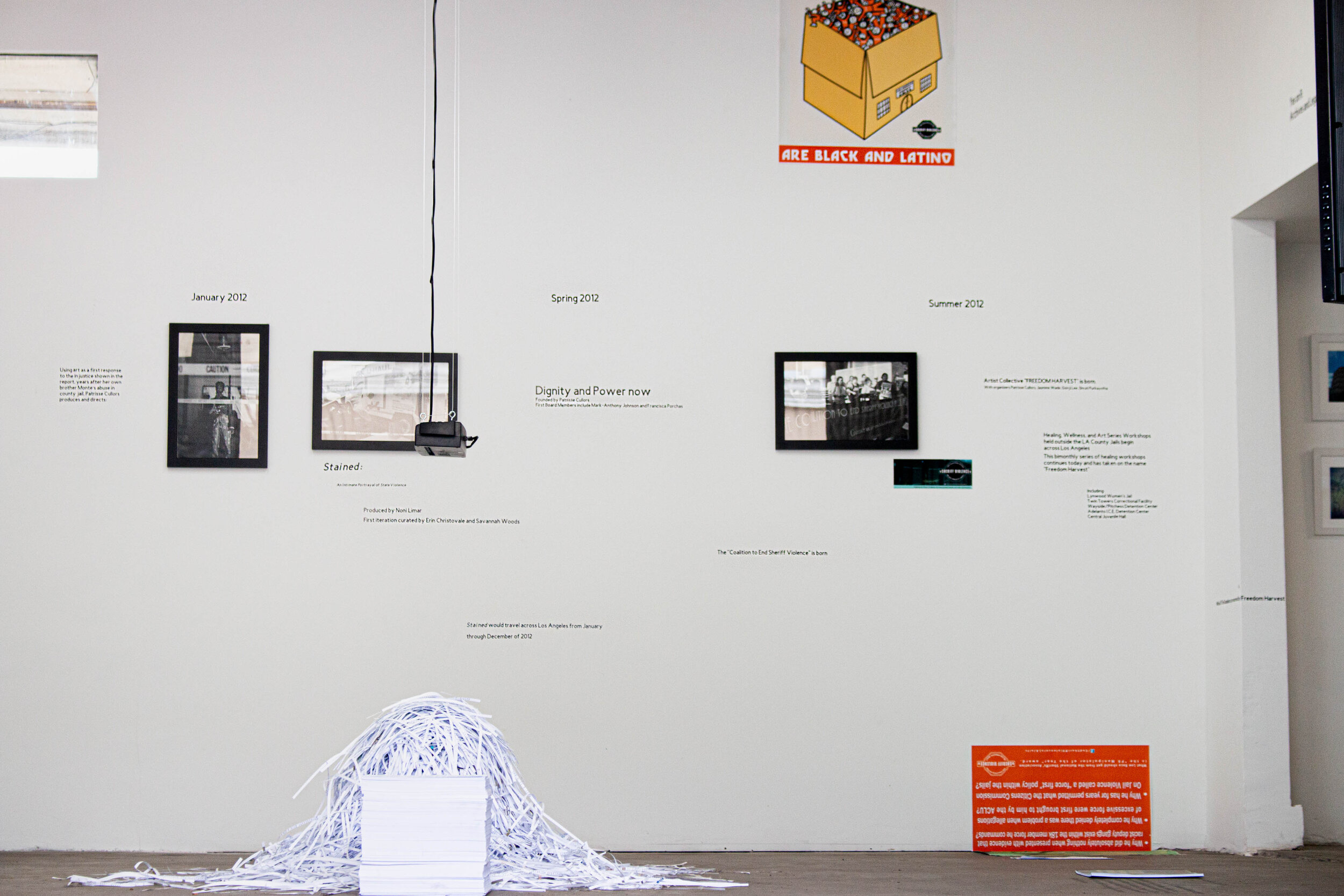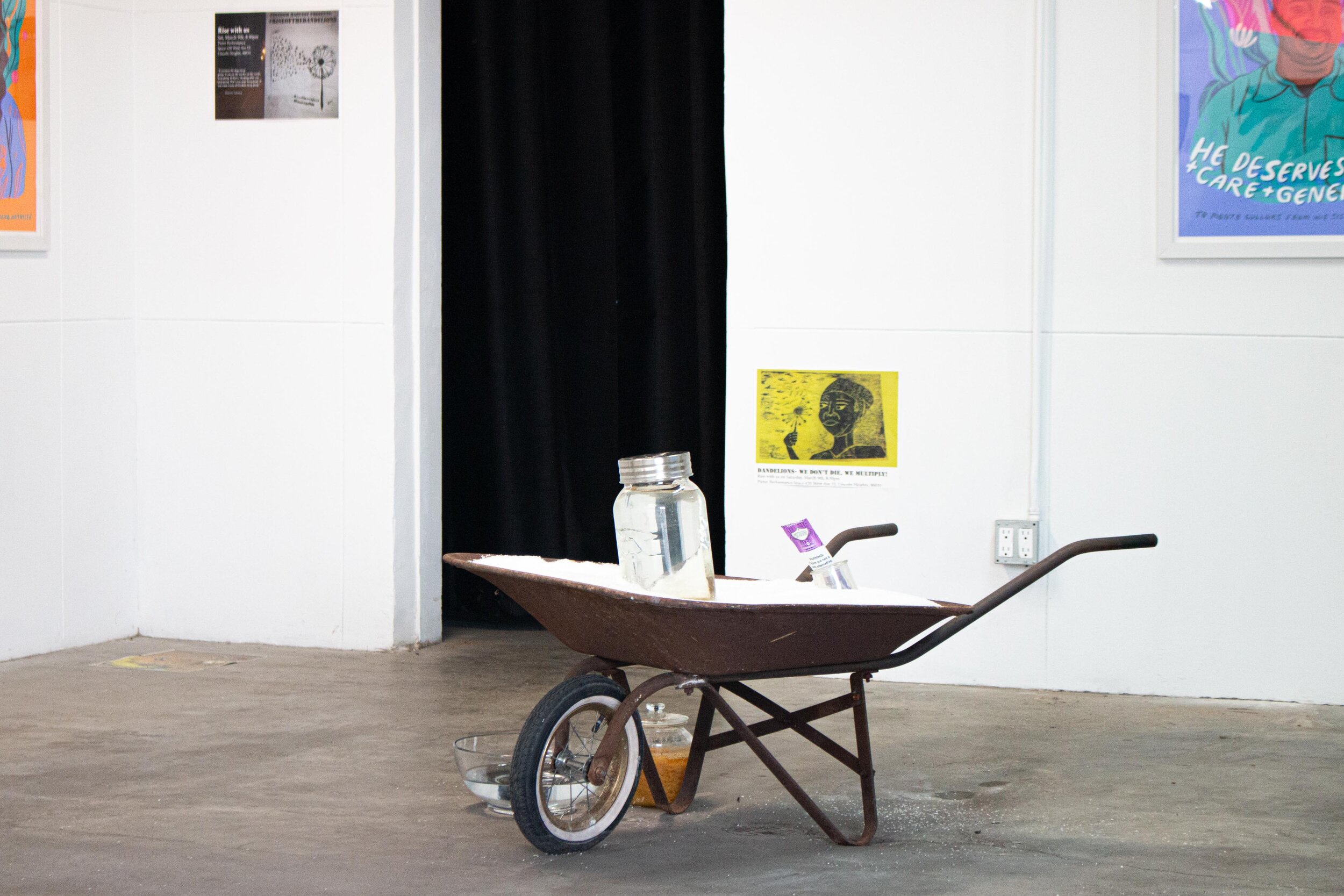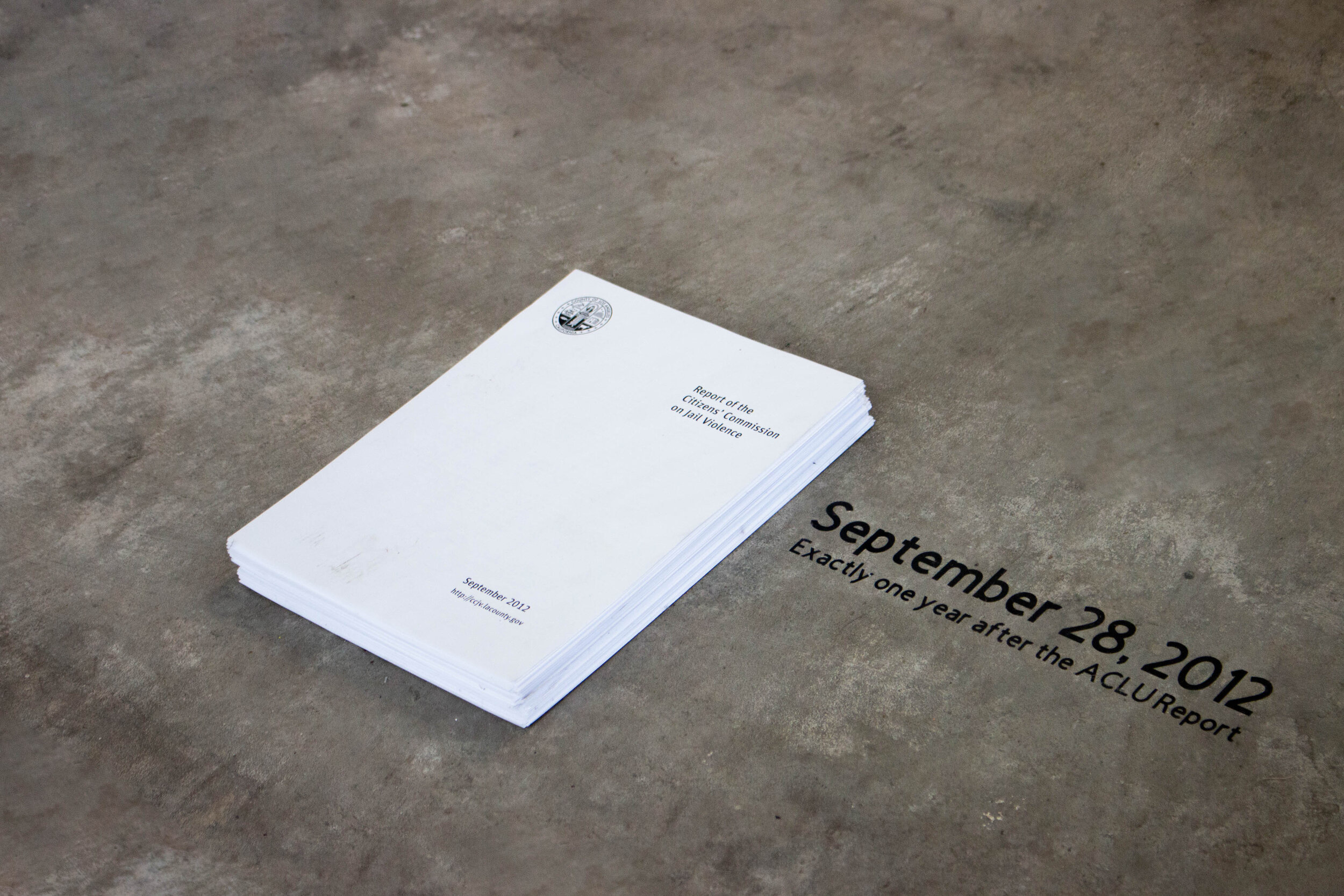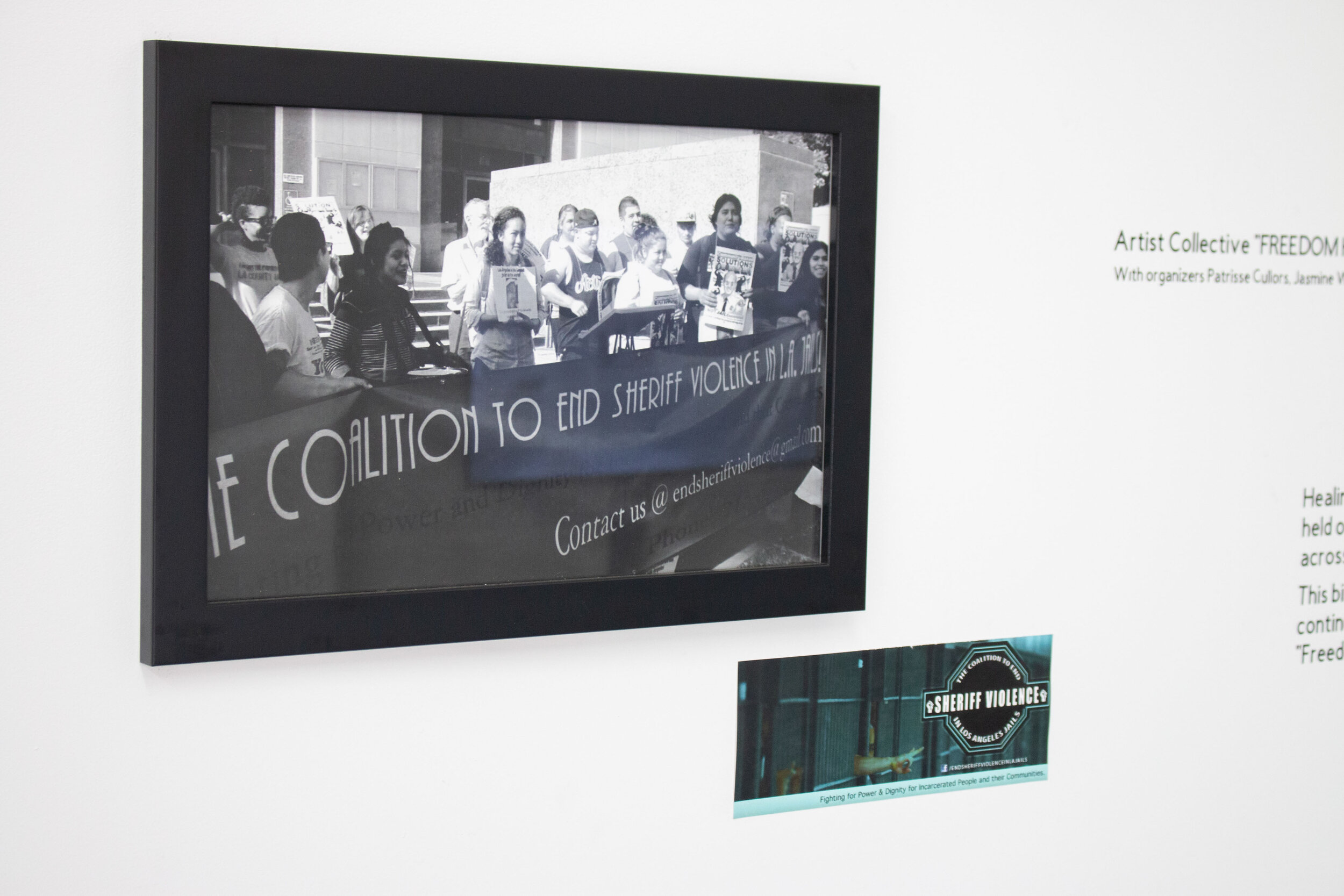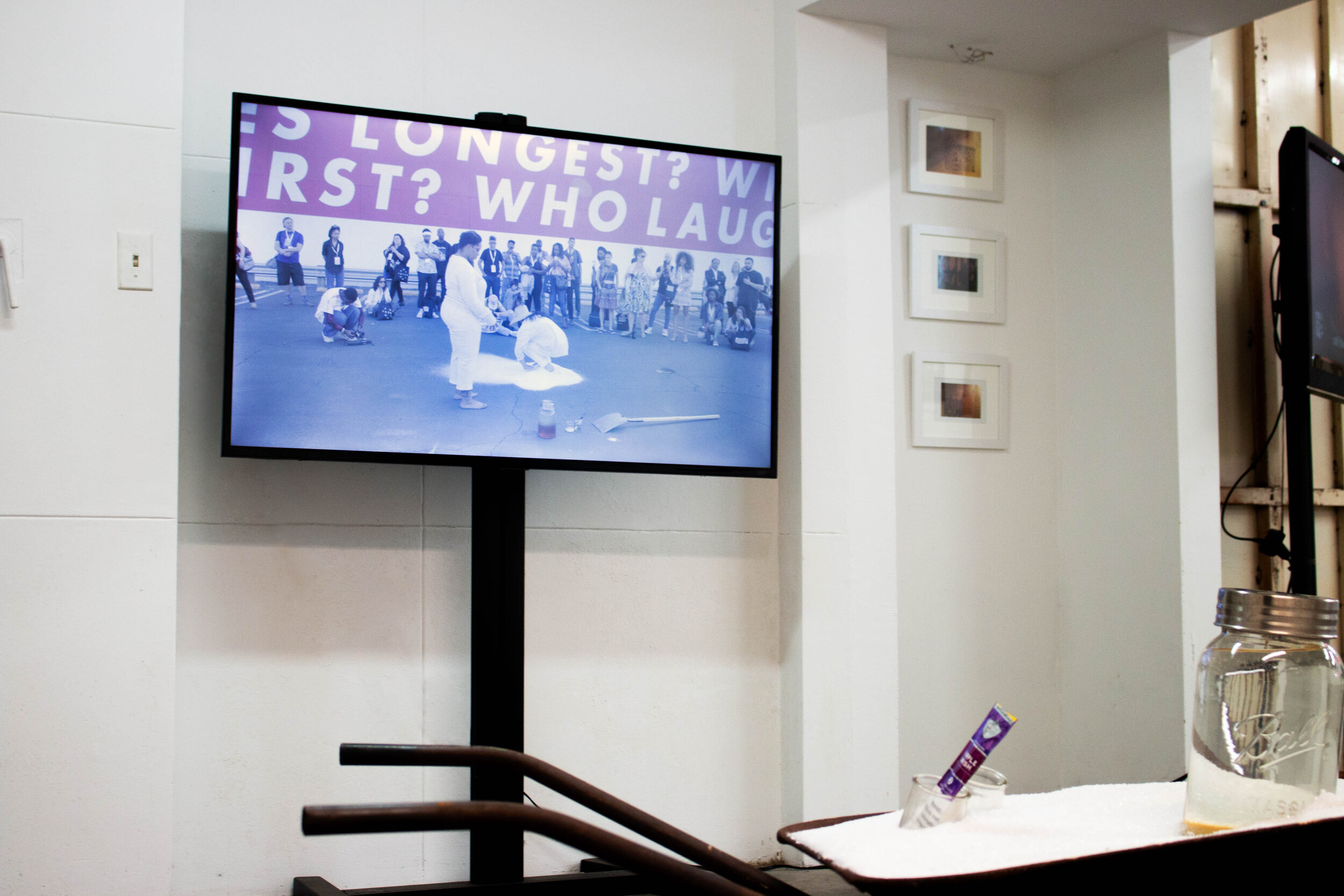YES on R!
Archives and Legal Conceptions
Part 1: 2011 - 2013
February 29, 2020 - December 29, 2020
“Yes on R! Archives and Legal Conceptions” examines the early organizing work between several local grassroots organizations over the span of nine years which successfully mobilized to implement Measure R on the 2020 Los Angeles, California primary elections ballot. “Part 1: 2011 - 2013” looks specifically to the conception of Dignity and Power Now, Reform LA Jails, and Justice LA and the many public art efforts which entangled these organizers’ practices. The 2011 ACLU of Southern California’s report is a pivotal moment providing local organizers substantial evidence to their grassroots efforts maintained for several years long before the release of the report, but gaining more recognition for a wide public. More central is the labor of organizers and movement workers, in an attempt to honor their individual and collective efforts, and their collective efforts to implement rehabilitation and mental health treatment as an alternative to the carceral state, which includes healing through community building and initiatives such as the Civilian Oversight Commission as they fit within the legacies of abolitionist movements.
The exhibition has specifically focused on how art, as either performance or public interventions, has always been a first responder to injustices within this movement effort. Stained: An Intimate Portrayal of State Violence by Patrisse Cullors in January 2012 was the first response to the report which highlighted the injustices Cullors’ brother Monte experienced during incarceration nearly a decade prior. That same year Cullors will birth The Coalition to End Sheriff Violence, which implemented the Civilian Oversight Committee (COC) in Los Angeles County Jails.
A recently published essay by Patrisse Cullors looks to Selma, Alabama 1965 and Dr. Martin Luther King’s organizing efforts to push - in solidarity with several grassroots movement organizers such as the NAACP, the Student Nonviolent Coordinating Committee (SNCC), and King’s own Southern Christian Leadership Conference - the Voting Rights Act of 1965. Cullors relates this 1965 movement to the conceptions and progression of “Yes on R” today; ultimately, it exhibits a strong correlation between voters’ suppression in the 1960s and carceral capitalism today.
In an effort to both bend and twist linear time which misrepresents Afrocentric political organizing, the exhibition looks to artwork exhibited today, yesterday. and tomorrow. As a prototype for using community participation to engage with both ballot measures and political organizing, “Yes on R! Archives and Legal Conceptions” attempts to only whisper the magnitude of this historical precedence towards the abolition movement.
A combination of both archival materials and objects invite the audience to actively engage with the subject matter. Audiences have the opportunity to tactilely engage with the artifacts with the intention of practicing their civil right of engagement and oversight by shredding the 2,865 pages of the 2014 “Architectural Program for Consolidated Correctional Treatment Facilities and Detention Centers” AKA Los Angeles County Jail Expansion Plan that is adjacent to the shredder. This plan was successfully halted by grassroots organizers. Yes on R! also reflects the call-and-response nature of community organizing as it relates to public need and the iterative nature of fixing broken systems. Inspired by organizers’ successful reimagination and implementation of a new system, the audience is also meant to reimagine the future of a new society without a carceral state. Just as the fight for Measure R serves as a prototype for community engagement, Yes on R! may serve as a prototype for illuminating the art, history, and potential of reformative movements.
The history highlighted proves that art has always played a role in organizing. This new reality of civilian oversight and reimagined systems coming to fruition call for art to continue to carry this torch. The exhibition’s opening on the weekend before Super Tuesday and the subsequent landslide victory by the Yes on R! Campaign, looks to the ongoing legacy of conversations between grassroots organizing and abolitionists’ policy change in America.
This exhibition has been curated by Autumn Breon Williams and Alexandre Ali Reza Dorriz
(Foreground: From left to right) Patrisse Cullors, work worn by Cullors for performance, Prayer to the Iyami, at the Broad Museum (2020) ; Paul Cullors, Saint Nip (2020) ; 2,865 pages of the 2014 “Architectural Program for Consolidated Correctional Treatment Facilities and Detention Centers,” AKA Los Angeles County Jail Expansion Plan, alongside paper shredder
(Background) Patrisse Cullors, Documentation from Performance, Stained: An Intimate Portrayal of Violence, 2012.
(left) Archived email written by Patrisse Cullors to Reform L.A. Jails team after the Los Angeles County Board of Supervisors’ unanimous vote to place Reform L.A. Jails initiative (later to be called, Ballot Measure R) on the California presidential primary March 3, 2020 ballot (dated October 11, 2018)
(Center) Patrisse Cullors, work worn by Cullors for performance, Prayer to the Iyami, at the Broad Museum, 2020.
(right) Paul Cullors, Saint Nip, 2020.
(Background: From left to Right) Archived email written by Patrisse Cullors to Reform L.A. Jails team after the Los Angeles County Board of Supervisors’ unanimous vote to place Reform L.A. Jails initiative (later to be called, Ballot Measure R) on the California presidential primary March 3, 2020 ballot (dated October 11, 2018) ; Patrisse Cullors, work worn by Cullors for performance, Prayer to the Iyami, at the Broad Museum, 2020. ; Paul Cullors, Saint Nip, 2020.
(Foreground) 2,865 pages of the 2014 “Architectural Program for Consolidated Correctional Treatment Facilities and Detention Centers,” AKA Los Angeles County Jail Expansion Plan, alongside paper shredder
(Background: From left to Right) Archived email written by Patrisse Cullors to Reform L.A. Jails team after the Los Angeles County Board of Supervisors’ unanimous vote to place Reform L.A. Jails initiative (later to be called, Ballot Measure R) on the California presidential primary March 3, 2020 ballot (dated October 11, 2018) ; Patrisse Cullors, work worn by Cullors for performance, Prayer to the Iyami, at the Broad Museum, 2020. ; Paul Cullors, Saint Nip, 2020.
(Foreground) 2,865 pages of the 2014 “Architectural Program for Consolidated Correctional Treatment Facilities and Detention Centers,” AKA Los Angeles County Jail Expansion Plan, alongside paper shredder
2,865 pages of the 2014 “Architectural Program for Consolidated Correctional Treatment Facilities and Detention Centers,” AKA Los Angeles County Jail Expansion Plan, alongside paper shredder
2,865 pages of the 2014 “Architectural Program for Consolidated Correctional Treatment Facilities and Detention Centers,” AKA Los Angeles County Jail Expansion Plan, alongside paper shredder
(FROM LEFT TO RIGHT) ARCHIVED EMAIL WRITTEN BY PATRISSE CULLORS TO REFORM L.A. JAILS TEAM AFTER THE LOS ANGELES COUNTY BOARD OF SUPERVISORS’ UNANIMOUS VOTE TO PLACE REFORM L.A. JAILS INITIATIVE (LATER TO BE CALLED, BALLOT MEASURE R) ON THE CALIFORNIA PRESIDENTIAL PRIMARY MARCH 3, 2020 BALLOT (DATED OCTOBER 11, 2018) ; PATRISSE CULLORS, WORK WORN BY CULLORS FOR PERFORMANCE, PRAYER TO THE IYAMI, AT THE BROAD MUSEUM, 2020.
(FROM LEFT TO RIGHT) PATRISSE CULLORS, WORK WORN BY CULLORS FOR PERFORMANCE, PRAYER TO THE IYAMI, AT THE BROAD MUSEUM, 2020. ; PAUL CULLORS, SAINT NIP, 2020.
(foreground) 2,865 pages of the 2014 “Architectural Program for Consolidated Correctional Treatment Facilities and Detention Centers,” AKA Los Angeles County Jail Expansion Plan, alongside paper shredder
(Background: From left to Right) Archived email written by Patrisse Cullors to Reform L.A. Jails team after the Los Angeles County Board of Supervisors’ unanimous vote to place Reform L.A. Jails initiative (later to be called, Ballot Measure R) on the California presidential primary March 3, 2020 ballot (dated October 11, 2018) ; Patrisse Cullors, work worn by Cullors for performance, Prayer to the Iyami, at the Broad Museum, 2020. ; Paul Cullors, Saint Nip, 2020.
(Foreground) 2,865 pages of the 2014 “Architectural Program for Consolidated Correctional Treatment Facilities and Detention Centers,” AKA Los Angeles County Jail Expansion Plan, alongside paper shredder
“Cruel and Usual Punishment: How a Savage Gang of Deputies controls LA County Jails” A Report by the ACLU National Prison Project and the ACLU of Southern California, September 2011.
Archived poster by The Coalition to End Sheriff Violence in Los Angeles Jails, “Would our Sheriff of the Year please explain…”, 2012.
Documentation of the Coalition to end Sheriff Violence actions, 2012.
Archived poster by The Coalition to End Sheriff Violence in Los Angeles Jails, “Would our Sheriff of the Year please explain…”, 2012.
Archived poster by The Coalition to End Sheriff Violence in Los Angeles Jails, “Would our Sheriff of the Year please explain…”, 2012.
Archived poster by The Coalition to End Sheriff Violence in Los Angeles Jails, “80% of the People locked up in the Los Angeles County Jails are Black and Latino”, 2012.
(Background: Left to Right): Series by Ashley Lukashevesky, 2019. ; Archived Event Flyer for "Freedom Harvest Collective Presents: #Riseofthedandelions”, 2013. ; Archived Event Flyer for “Freedom Harvest Collective Presents: Dandelions - WE DON’T DIE, WE MULTIPLY!”, 2013.
(Foreground) Patrisse Cullors and noé olivas, works from performance, “Untitled (It’s Dangerous Times, We Have to Be Connected)”, 2018.
(Background: Left to Right): Series by Ashley Lukashevesky, 2019. ; Archived Event Flyer for "Freedom Harvest Collective Presents: #Riseofthedandelions”, 2013. ; Archived Event Flyer for “Freedom Harvest Collective Presents: Dandelions - WE DON’T DIE, WE MULTIPLY!”, 2013.
(Foreground) Patrisse Cullors and noé olivas, works from performance, “Untitled (It’s Dangerous Times, We Have to Be Connected)”, 2018.
Series by Ashley Lukashevesky, 2019.
(Left to Right) Series by Ashley Lukashevesky, 2019.
Reform LA Jails, Yes on R Campaign videos, “Yes on R!”, 2020
Series by Ashley Lukashevesky, 2019.
(Background: Left to Right) Series by Ashley Lukashevesky, 2019. ; Archived Event Flyer for "Freedom Harvest Collective Presents: #Riseofthedandelions”, 2013. ; Archived Event Flyer for “Freedom Harvest Collective Presents: Dandelions - WE DON’T DIE, WE MULTIPLY!”, 2013.
(Foreground) Patrisse Cullors and noé olivas, works from performance, “Untitled (It’s Dangerous Times, We Have to Be Connected)”, 2018.
(Left to Right) Series by Ashley Lukashevesky, 2019. ; Archived Event Flyer for "Freedom Harvest Collective Presents: #Riseofthedandelions”, 2013.
Archived Event Flyer for “Freedom Harvest Collective Presents: Dandelions - WE DON’T DIE, WE MULTIPLY!”, 2013.
Archived Event Flyer for "Freedom Harvest Collective Presents: #Riseofthedandelions”, 2013.
(Background) Patrisse Cullors and noé olivas, works from performance, “Untitled (It’s Dangerous Times, We Have to Be Connected)” DocuMentation from the Museum of Contemporary Art (MOCA), 2020.
(Foreground) Patrisse Cullors and noé olivas, works from performance, “Untitled (It’s Dangerous Times, We Have to Be Connected)”, 2018.
Patrisse Cullors and noé olivas, works from performance, “Untitled (It’s Dangerous Times, We Have to Be Connected)” DocuMentation from the Museum of Contemporary Art (MOCA), 2020.




















